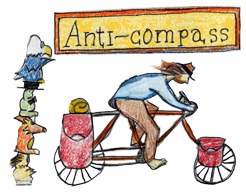
In the tropics, before all else, remain calm. - Heart of Darkness, by Josef Conrad
For one who is used to travel by bicycle in the United States, Canada or Western Europe, tropical Latin America may come as a shock upon the senses and sensibilities. I attempt in this page to describe some of the things I've encountered on my journey for the first time, and the response I've developed to them when encountered on subsequent occasions.
- Situation: Immediately after crossing the border from California, USA into Baja California Norte, Mexico I realized that I was in a culture very different from my own. Later I would look back on Mexico and realize that many of these differences were superficial, and that greater ones were to come as I traveled further south. The first and most obvious difference is the widespread use of Spanish as the language of communication. I had flirted with Spanish in the weeks preceding my entry into Mexico by listening to tapes, but I was surprised by how few people spoke any English whatsoever.
+ Solution: There is no easy way to get around the general lack of English understanding in Latin America. There are millions of people in this cultural region of the world that speak some dialect of Spanish (most dialects are mutually intelligible), and it is unrealistic to expect them all to switch to English in the near future.
Instead, I recommend learning Spanish. The way I tackled this problem was to enroll myself at a school in Mexico for several weeks until my personal balance point between money and time spent, and fluency gained was reached. After that I improved myself by chatting with anyone who had the patience to talk with me. As time went by I found that my Spanish improved until the things I thought I was saying generally provoked the responses I thought I should get. I suppose that gaining Spanish fluency before entering Latin America would work as well, but this would deprive both you and your would-be conversation parter of the bonding exercise of surmounting a cultural barrier together.
- Situation: Also after entering Mexico, I encountered large numbers of dead animals along the side of the road. Many had been hit by automobiles, but some had just decided to give up the ghost while being overworked nearby. Regardless of the manner of their death, both the repulsive smell of decaying animals and the continual confrontation with the reality of ones own mortality can dampen any mood.
+ Solution: Until animals are treated more humanely, and also develop a healthy fear of roads through natural selection this problem won't go away. Luckily, after thousand of dead animal sightings, one grows cold to their plight and learns to hold his nose to the stench. I'm really sorry that this happened to me, but it does happen.
- Situation: Before many of them meet their gruesome end on the side of the road, latin dogs enjoy some of the most liberal rights of any domestic animal in the world. The are free to protect their territory in any way they see fit, from anything they feel is a threat. And there is nothing more threatening than a cyclist riding by. These dogs will bark and chase for several hundred yards before deciding their duty is done.
+ Solution: I have never encountered a dog yet who has tried to bite me, so fear is generally misplaced. However, if you do feel threatened by a dog, or find one whose jaws have managed to clamp onto your leg, know that throwing rocks, pretending to throw a rock, kicking and charging all seem to deter the dogs long enough to give you an escape. They also aren't particularly quick, when compared to a bicycle, and can often be outrun. Also by going at exactly the right pace, you can lure them well out of their terriority and cause them to have to walk a considerable distance back to their lookout post. This is more satisfying than you might suspect.
- Situation: You are used to going to a supermarket along the road, buying fresh fruit and vegetables as well as your favorite high-calorie fuel foods riding down the road to a campground, and cooking. Now you find that markets, when they have fruit and vegetables at all, have rotten products covered in flies. Peanut butter costs more than putting a child through college, no one has ever heard of a bagel, and they are nuts for corn tortillas.
+ Solution: This was tough. I was used to eating whole grain everything, covering my wheat-filled products with peanut butter, making delicious sandwiches filled with several types of layerable vegetable, and being able to do so several times during a given ride. But one adapts. For me this meant embracing soda for calories (ugh!), eating barely palatable corn tortillas, terrible bread which had a life expectancy longer than my own, and going whole hog on rice and beans. But it also means dirt cheap avocados, onions, hot hot hot peppers, tequila and mezcal (in Mexico), rum (in Central America), as well as the chance to adapt to an entirely different culinary tradition. And in Mexico, this became one of the highlights of the trip. In Central America and Colombia this meant an increasing variety of new tropical fruit, several different varieties of banana and melon, and towards South America yucca as well. At the time of this writing I am in Colombia, anticipating my arrival into the native land of the potato and quinoa.